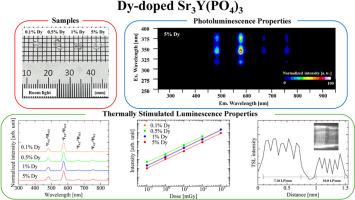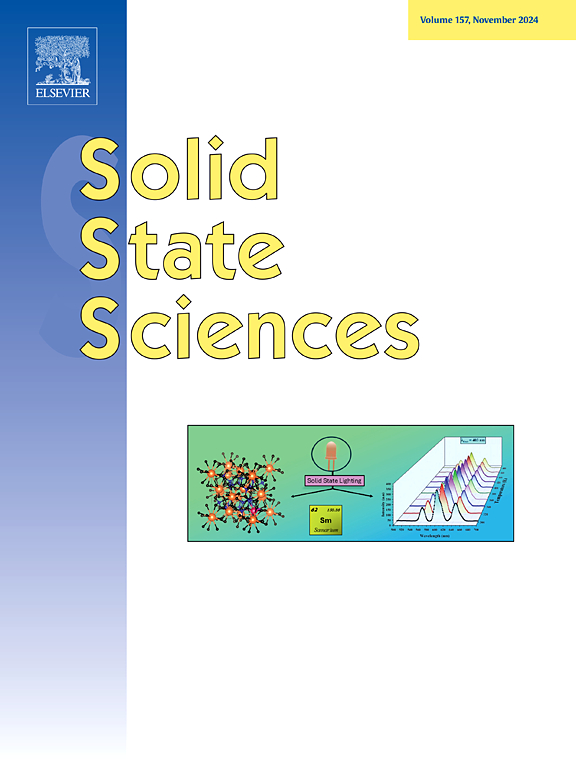Photoluminescence and thermally stimulated luminescence properties of Sr3Y(PO4)3 single crystals doped with dy
IF 3.4
3区 化学
Q2 CHEMISTRY, INORGANIC & NUCLEAR
引用次数: 0
Abstract
Sr3Y(PO4)3 (SYPO) is recognized as a highly promising material for dosimetry applications, owing to its dosimetric properties. In this work, we synthesized the SYPO single crystals doped with 0.1, 0.5, 1, and 5 % Dy using the floating zone furnace to evaluate the photoluminescence and thermally stimulated luminescence (TSL) characteristics. All the SYPO single crystals doped with Dy exhibited emission peaks at 480, 580, 670, and 760 nm in PL and TSL spectra. These emission peaks were typical for the 4f–4f transitions of Dy3+ ions. The SYPO single crystal doped with 0.1 % Dy displayed a glow peak in the TSL glow curve at 70 °C. The SYPO single crystals doped with 0.5, 1, and 5 % Dy showed two glow peaks at approximately 70 and 110 °C. The SYPO single crystal doped with 0.5 % Dy exhibited the highest TSL intensity with a lower detection limit of 0.1 mGy. The SYPO single crystal doped with 0.5 % Dy showed a spatial resolution of 50.0 μm after X-ray irradiation of 1Gy.

掺杂镝的 Sr3Y(PO4)3 单晶的光致发光和热激发发光特性
Sr3Y(PO4)3(SYPO)因其剂量测定特性而被认为是一种极具潜力的剂量测定应用材料。在这项工作中,我们利用浮区炉合成了掺杂 0.1%、0.5%、1% 和 5% Dy 的 SYPO 单晶,并对其光致发光和热激发发光(TSL)特性进行了评估。在 PL 和 TSL 光谱中,所有掺入 Dy 的 SYPO 单晶都在 480、580、670 和 760 纳米波长处显示出发射峰。这些发射峰是典型的 Dy3+ 离子的 4f-4f 转变。掺杂了 0.1 % Dy 的 SYPO 单晶在 70 °C 时的 TSL 辉光曲线中显示出一个辉光峰。掺杂了 0.5%、1% 和 5% Dy 的 SYPO 单晶在大约 70 ℃ 和 110 ℃ 处显示出两个辉光峰。掺入 0.5 % Dy 的 SYPO 单晶显示出最高的 TSL 强度,检测下限为 0.1 mGy。掺入 0.5 % Dy 的 SYPO 单晶体在 1Gy X 射线照射后显示出 50.0 μm 的空间分辨率。
本文章由计算机程序翻译,如有差异,请以英文原文为准。
求助全文
约1分钟内获得全文
求助全文
来源期刊

Solid State Sciences
化学-无机化学与核化学
CiteScore
6.60
自引率
2.90%
发文量
214
审稿时长
27 days
期刊介绍:
Solid State Sciences is the journal for researchers from the broad solid state chemistry and physics community. It publishes key articles on all aspects of solid state synthesis, structure-property relationships, theory and functionalities, in relation with experiments.
Key topics for stand-alone papers and special issues:
-Novel ways of synthesis, inorganic functional materials, including porous and glassy materials, hybrid organic-inorganic compounds and nanomaterials
-Physical properties, emphasizing but not limited to the electrical, magnetical and optical features
-Materials related to information technology and energy and environmental sciences.
The journal publishes feature articles from experts in the field upon invitation.
Solid State Sciences - your gateway to energy-related materials.
 求助内容:
求助内容: 应助结果提醒方式:
应助结果提醒方式:


